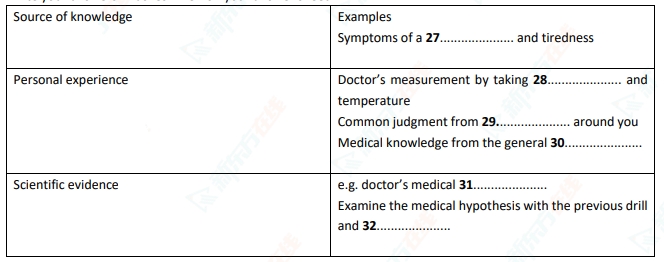

雅思备考规划
扫码添加助教免费咨询雅思备考规划

扫码下载 新东方雅思Pro APP,雅思备考一站式工具
本文为大家带来的是雅思阅读模拟题:Knowledge in medicine,帮助大家备考雅思.
点击查看》》》雅思阅读模拟题汇总【备考必刷】
A What counts as knowledge? What do we mean when we say that we know something? What is the status of different kinds of knowledge? In order to explore these questions, we are going to focus on one particular area of knowledge – medicine.
B How do you know when you are ill? This may seem to be an absurd question. You know you are ill because you feel ill; your body tells you that you are ill. You may know that you feel pain or discomfort but knowing you are ill is a bit more complex. At times, people experience the symptoms of illness, but in fact, they are simply tired or over- worked or they may just have a hangover. At other times, people may be suffering from a disease and fail to be aware of the illness until it has reached a late stage in its development. So how do we know we are ill, and what counts as knowledge?
C Think about this example. You feel unwell. You have a bad cough and always seem to be tired. Perhaps it could be stress at work, or maybe you should give up smoking. You feel worse. You visit the doctor who listens to your chest and heart, takes your temperature and blood pressure, and then finally prescribes antibiotics for your cough.
D Things do not improve but you struggle on thinking you should pull yourself together, perhaps things will ease off at work soon. A return visit to your doctor shocks you. This time the doctor, drawing on years of training and experience, diagnoses pneumonia. This means that you will need bed rest and a considerable time off work. The scenario is transformed. Although you still have the same symptoms, you no longer think that these are caused by pressure at work. You know have proof that you are ill. This is the result of the combination of your own subjective experience and the diagnosis of someone who has the status of a medical expert. You have a medically authenticated diagnosis and it appears that you are seriously ill; you know you are ill and have the evidence upon which to base this knowledge.
E This scenario shows many different sources of knowledge. For example, you decide to consult the doctor in the first place because you feel unwell – this is personal knowledge about your own body. However, the doctor’s expert diagnosis is based on experience and training, with sources of knowledge as diverse as other experts, laboratory reports, medical textbooks and years of experience.
F One source of knowledge is the experience of our own bodies; the personal knowledge we have of changes that might be significant, as well as the subjective experiences are mediated by other forms of knowledge such as the words we have available to describe our experience, and the common sense of our families and friends as well as that drawn from popular culture. Over the past decade, for example, Western culture has seen a significant emphasis on stress-related illness in the media. Reference to being ‘stressed out’ has become a common response in daily exchanges in the workplace and has become part of popular common-sense knowledge. It is thus not surprising that we might seek such an explanation of physical symptoms of discomfort.
G We might also rely on the observations of others who know us. Comments from friends and family such as ‘you do look ill’ or ‘that’s a bad cough’ might be another source of knowledge. Complementary health practices, such as holistic medicine, produce their own sets of knowledge upon which we might also draw in deciding the nature and degree of our ill health and about possible treatments.
H Perhaps the most influential and authoritative source of knowledge is the medical knowledge provided by the general practitioner. We expect the doctor to have access to expert knowledge. This is socially sanctioned. It would not be acceptable to notify our employer that we simply felt too unwell to turn up for work or that our faith healer, astrologer, therapist or even our priest thought it was not a good idea. We need an expert medical diagnosis in order to obtain the necessary certificate if we need to be off work for more than the statutory self-certification period. The knowledge of the medical sciences is privileged in this respect in contemporary Western culture. Medical practitioners are also seen as having the required expert knowledge that permits them legally to prescribe drugs and treatment to which patients would not otherwise have access. However, there is a range of different knowledge upon which we draw when making decisions about our own state of health.
I However, there is more than existing knowledge in this little story; new knowledge is constructed within it. Given the doctor’s medical training and background, she may hypothesize ‘is this now pneumonia?’ and then proceed to look for evidence about it. She will use observations and instruments to assess the evidence and – critically – interpret it in light of her training and experience. This results in new knowledge and new experience both for you and for the doctor. This will then be added to the doctor’s medical knowledge and may help in the future diagnosis of pneumonia.
Questions 27-32
Complete the table
Choose NO MORE THAN THREE WORDS from the passage for each answer. Write your answers in boxes 27-32 on your answer sheet

Questions 33-40
The Reading Passage has nine paragraphs A-I
Which paragraph contains the following information?
Write the correct letter A-I, in boxes 33-40 on your answer sheet.
33 ....................... the contrast between the nature of personal judgment and the nature of doctor’s diagnosis
34 ....................... a reference of culture about pressure
35 ....................... sick leave will not be permitted without the professional diagnosis
36 ....................... how doctors’ opinions are regarded in society
37 ....................... the illness of patients can become part of new knowledge
38 ....................... a description of knowledge drawn from non-specialized sources other than personal knowledge
39 ....................... an example of collective judgment from personal experience and professional doctor
40 ....................... a reference that some people do not realize they are ill
Answer keys
27. bad cough
28. blood pressure
29. families and friends
30. Practitioner
31. Diagnosis
32. background
33. E
34. F
35. H
36. H
37. I
38. G
39. D
40. B
【雅思免费试听课-0元领取】
【雅思水平测试-免费】
【雅思备考资料-扫码添加助教免费领取】


 资料下载
资料下载
核心1200词单词卡下载
发布时间:2025-04-15添加新东方在线雅思助教号
回复【单词卡】获取
雅思写作高频词汇PDF下载
发布时间:2025-02-06添加新东方在线雅思助教号
回复【200】获取
590组雅思阅读写作必背短语PDF版下载
发布时间:2023-08-09添加新东方在线雅思助教号
回复【590】获取
雅思学术词汇搭配表PDF版下载
发布时间:2023-08-04添加新东方在线雅思助教号
回复【ACL】获取
雅思口语part3结构策略PDF版下载
发布时间:2023-08-04添加新东方在线雅思助教号
回复【Part3】获取
雅思听力高频场景词PDF版下载
发布时间:2023-08-09添加新东方在线雅思助教号
回复【高频词】获取
雅思口语Part2答案示范15篇PDF下载
发布时间:2023-07-26添加新东方在线雅思助教号
回复【P2】获取
雅思小作文35组必备表达PDF下载
发布时间:2023-07-26添加新东方在线雅思助教号
回复【35】获取
雅思阅读高频短语PDF下载
发布时间:2023-07-20添加新东方在线雅思助教号
回复【短语】获取
200组雅思写作高频词汇PDF下载
发布时间:2023-07-20添加新东方在线雅思助教号
回复【200】获取
雅思写作话题词汇PDF下载
发布时间:2023-07-16添加新东方在线雅思助教号
回复【话题】获取
50组雅思口语同义替换词PDF下载
发布时间:2023-07-10添加新东方在线雅思助教号
回复【替换】获取
雅思写作大作文精选题目101PDF下载
发布时间:2023-07-09添加新东方在线雅思助教号
回复【101】获取
雅思口语核心300词PDF下载
发布时间:2023-06-23添加新东方在线雅思助教号
回复【300】获取
雅思阅读分类词汇PDF下载
发布时间:2023-06-17添加新东方在线雅思助教号
回复【分类词】获取
雅思口语必备习语PDF下载
发布时间:2023-06-17添加新东方在线雅思助教号
回复【习语】获取
雅思小作文常用词汇66词PDF下载
发布时间:2023-06-16添加新东方在线雅思助教号
回复【66】获取
雅思口语常见功能结构109句PDF下载
发布时间:2023-06-08添加新东方在线雅思助教号
回复【109】获取
10年雅思写作题库PDF下载
发布时间:2023-06-08添加新东方在线雅思助教号
回复【写作话题】获取
雅思图表作文精选套句50句PDF下载
发布时间:2023-05-28添加新东方在线雅思助教号
回复【50】获取
雅思写作99组高频词汇PDF资料
发布时间:2023-05-28添加新东方在线雅思助教号
回复【99】获取
2023年5月雅思口语新题题库PDF版本
发布时间:2023-05-14添加新东方在线雅思助教号
回复【新题】获取
2023年5-8月雅思口语新题题库与解析PDF版本
发布时间:2023-05-06关注新东方在线考雅课程中心服务号
回复【新题】获取
雅思听力考点词汇PDF资料
发布时间:2023-04-27添加新东方在线雅思助教号
回复【考点词】获取
雅思听力机经词汇PDF资料
发布时间:2023-04-24添加新东方在线雅思助教号
回复【TL】获取
雅思口语Part1常见话题语料库PDF资料
发布时间:2023-04-20添加新东方在线雅思助教号
回复【Part1】获取
剑桥雅思阅读长难句50句PDF资料
发布时间:2023-04-19添加新东方在线雅思助教号
回复【长难句】获取
雅思阅读核心学术词汇表PDF资料
发布时间:2023-04-07关注新东方在线考雅课程中心服务号
回复【核心】获取
100个雅思写作观点词和替换词表达PDF资料
发布时间:2023-03-24关注新东方在线考雅课程中心服务号
回复【100】获取
雅思阅读分类词汇PDF资料
发布时间:2023-03-22关注新东方在线考雅课程中心服务号
回复【分类词】获取

添加新东方在线雅思助教,
回复【口语】获取雅思口语资料大礼包

 推荐阅读
推荐阅读
本文为大家带来的是雅思阅读模拟题:The beginning of intelligence,帮助大家备考雅思
本文为大家带来的是雅思阅读模拟题:So you think humans are unique,帮助大家备考雅思
本文为大家带来的是雅思阅读模拟题:The History of Tea,帮助大家备考雅思
本文为大家带来的是雅思阅读模拟题:Father of Modern Management,帮助大家备考雅思
本文为大家带来的是雅思阅读模拟题:Reading in a whole new way,帮助大家备考雅思










 资料下载
资料下载
添加新东方在线雅思助教号
回复【单词卡】获取
添加新东方在线雅思助教号
回复【200】获取
添加新东方在线雅思助教号
回复【590】获取
添加新东方在线雅思助教号
回复【ACL】获取
添加新东方在线雅思助教号
回复【Part3】获取
添加新东方在线雅思助教号
回复【高频词】获取
添加新东方在线雅思助教号
回复【P2】获取
添加新东方在线雅思助教号
回复【35】获取
添加新东方在线雅思助教号
回复【短语】获取
添加新东方在线雅思助教号
回复【200】获取
添加新东方在线雅思助教号
回复【话题】获取
添加新东方在线雅思助教号
回复【替换】获取
添加新东方在线雅思助教号
回复【101】获取
添加新东方在线雅思助教号
回复【300】获取
添加新东方在线雅思助教号
回复【分类词】获取
添加新东方在线雅思助教号
回复【习语】获取
添加新东方在线雅思助教号
回复【66】获取
添加新东方在线雅思助教号
回复【109】获取
添加新东方在线雅思助教号
回复【写作话题】获取
添加新东方在线雅思助教号
回复【50】获取
添加新东方在线雅思助教号
回复【99】获取
添加新东方在线雅思助教号
回复【新题】获取
关注新东方在线考雅课程中心服务号
回复【新题】获取
添加新东方在线雅思助教号
回复【考点词】获取
添加新东方在线雅思助教号
回复【TL】获取
添加新东方在线雅思助教号
回复【Part1】获取
添加新东方在线雅思助教号
回复【长难句】获取
关注新东方在线考雅课程中心服务号
回复【核心】获取
关注新东方在线考雅课程中心服务号
回复【100】获取
关注新东方在线考雅课程中心服务号
回复【分类词】获取

 编辑推荐
编辑推荐
 雅思新题
雅思新题
 阅读排行榜
阅读排行榜
 相关内容
相关内容